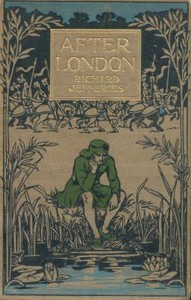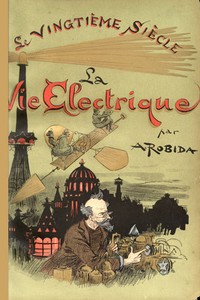Science
Filter Criteria
sort order
After London Or, Wild England by Richard Jefferies
"After London Or, Wild England" by Richard Jefferies is a speculative novel written during the late 19th century. The book imagines a future England transformed into a primitive world after civilization has collapsed and nature has reclaimed the land. The narrative explores themes of technology, society, and the natural world, showcasing characters such as Felix Aquila, who navigates this wild and unfamiliar landscape. The opening of the novel paints a vivid picture of post-apocalyptic England, describing how nature has overrun the landscapes once dominated by human civilization. It depicts a time when cities are forgotten, transformed into marshes, and domesticated animals have reverted to wild forms. The narrative presents a detailed account of the flora and fauna that have reclaimed the land, emphasizing the environmental changes that have led to a society that regresses into tribalism and barbarism. This transition sets the stage for the adventures of Felix Aquila and the encounters he faces in this new wild England. (This is an automatically generated summary.) This novel content is quoted from public domain works, from Project Gutenberg ([https://www.gutenberg.org/](https://www.gutenberg.org/)). Project Gutenberg is a project dedicated to digitizing and archiving public domain books. The works it provides have expired copyright and legally entered the public domain. Providing these classic works free of charge is intended to promote cultural dissemination and reading convenience. We sincerely thank Project Gutenberg for its efforts and provide links to the original content for reference. If you want to learn more about public domain works or download these contents directly, please visit the [Project Gutenberg website](https://www.gutenberg.org/).
5chapterjoin
Le Vingtième Siècle: La Vie Électrique by Albert Robida
"Le Vingtième Siècle: La Vie Électrique" by Albert Robida is a speculative fiction work written in the late 19th century. The book explores a future society in the year 1955, where advanced technology, particularly electricity, plays a pivotal role in everyday life. The narrative focuses on the character Philoxène Lorris, a renowned inventor, and his son Georges, highlighting their dynamic relationship and the societal changes brought about by technological advancements. At the start of the novel, an intense electrical storm, referred to as a "tournade," disrupts the region of Europe. This serves as a backdrop for introducing Philoxène Lorris, who is scolding his son Georges for not achieving enough in life compared to his own accomplishments. Through a vivid description of the society's manipulation of weather and climate through electrical means, Robida sets the stage for discussions on atavism, personal ambition, and the impact of technological progress. The opening establishes a tension between tradition and innovation, pointing to possible future conflicts as Philoxène expresses concern over Georges’ perceived lack of scientific aptitude, possibly due to their ancestry, and suggests a marriage to ensure a scientifically capable lineage. (This is an automatically generated summary.) This novel content is quoted from public domain works, from Project Gutenberg ([https://www.gutenberg.org/](https://www.gutenberg.org/)). Project Gutenberg is a project dedicated to digitizing and archiving public domain books. The works it provides have expired copyright and legally entered the public domain. Providing these classic works free of charge is intended to promote cultural dissemination and reading convenience. We sincerely thank Project Gutenberg for its efforts and provide links to the original content for reference. If you want to learn more about public domain works or download these contents directly, please visit the [Project Gutenberg website](https://www.gutenberg.org/).
3chapterjoin


